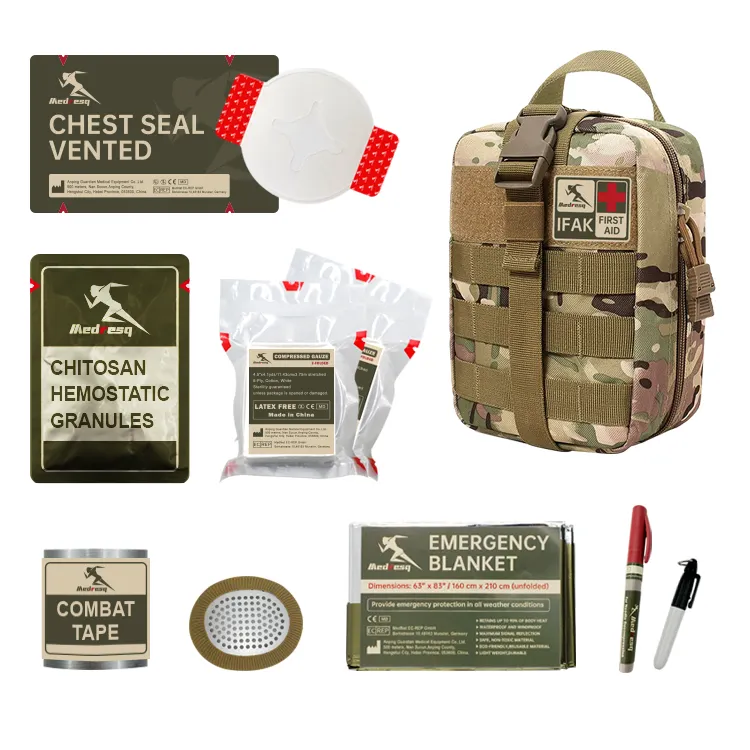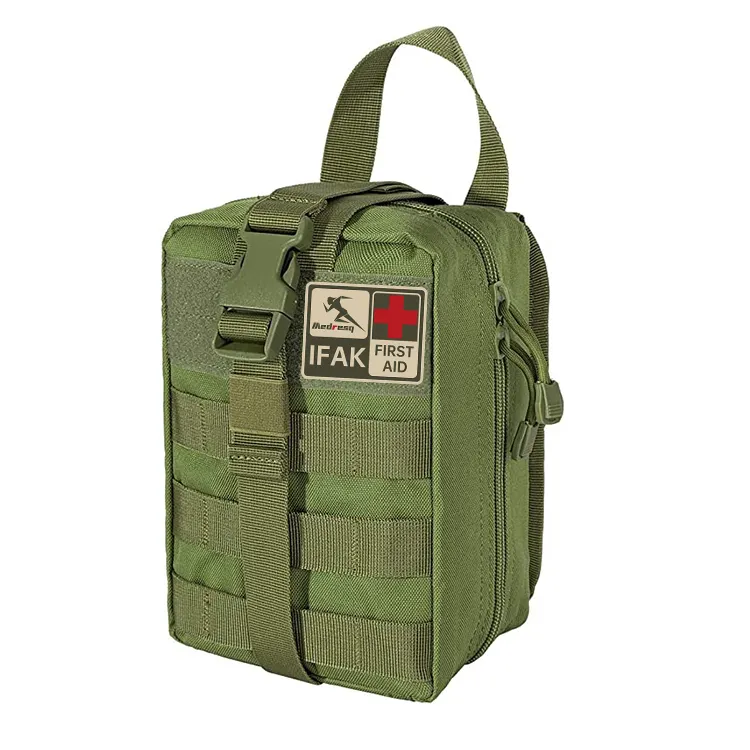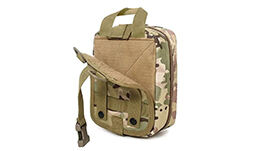緊急対応の強化:創傷ケアにおけるIFAKの役割
戦闘や野外探検という予測不可能な環境では、適時かつ効果的な外傷ケアが生死を分けることがあります。緊急対応の専門家たちは、 Individual First Aid Kit (IFAK) と呼ばれる、外傷治療に特化したコンパクトな救急キットを持つことの重要性をますます強調しています。これらの環境で生命を脅かす重傷を負う可能性が依然として高い中、IFAKは軍人、救急隊員、そして冒険家にとって欠かせないツールとなっています。本記事では、IFAKの主要な特徴、内容、および用途について探り、その緊急医療対応における重要な役割に焦点を当てます。
IFAKの構成
コンパクトで携帯性のある設計
IFAKの特徴の一つは、そのコンパクトで携帯性の高いデザインです。さまざまな環境での使用を想定して設計されたこれらのキットは、個人が持ち運ぶのに十分小さく、バックパックやベストなどの戦術的な装備に便利に統合できます。この携帯性により、必要な医療用品が常に手の届く範囲にあり、場所を問わず緊急事態への迅速な対応が可能になります。

素早いアクセス機能
緊急時において、一秒たりとも無駄にできません。この認識に基づき、IFAKは素早いアクセスと使いやすさを重視して設計されています。多くのIFAKには、簡単に開けるジッパーやフックアンドループ式の留め具、そして必要な用品を迅速に見つけ出し利用できる内部整理システムが備わっています。このような効率的な設計は、負傷によるさらなる合併症を防ぐための重要な要素である対応時間の短縮に役立ちます。
耐久性と適応性
高強度で耐久性のある素材から作られ、IFAKは過酷な環境に耐えるように設計されています。極端な気温、高い湿度、または埃っぽい環境下でも、これらのキットはその機能を維持し、中身を安全かつ乾燥した状態に保ちます。頑丈な構造により、医療用品は外部からの圧力や衝撃から保護され、必要とする時にキットが機能することを確保します。
IFAKの主要な内容物
IFAKには、重傷や命にかかわる怪我に対処するために選ばれたさまざまな医療用品が装備されています。以下はIFAKの典型的な部品です:
ターニケート
止血帯は、戦闘やサバイバルの場面で遭遇する緊急事態である重度の動脈出血を制御するために不可欠です。Combat Application Tourniquet (CAT) や SOF-T 止血帯などのモデルは、その信頼性と使いやすさから人気があり、片手でも簡単に使用でき、命にかかわる出血を迅速に安定させることができます。
止血ガーゼ
IFAKには、迅速に出血を止めるために設計されたさまざまな止血包帯が含まれることがよくあります。これらの包帯は進化した素材を使用して凝固を促進し、傷口に効果的な圧力を与え、緊急時の状況で血液損失を管理可能にします。
創傷用バンデージ
創傷用バンデージは、伤口を固定・保護し、さらなる損傷や感染を防ぎます。そのデザインは高い可動域に対応しており、圧縮とカバーを維持するために必要な柔軟性と強度を提供します。
手袋と消毒ワイプ s
傷の処置中に衛生状態を保つため、IFAKには医用手袋と消毒ワイプが含まれています。これらのアイテムは感染リスクを低減し、怪我の治療時に清潔な環境を確保します。
気道管理用ツール
トラウマシザーズや鼻腔など、複雑な損傷の管理を支援し、呼吸路が閉塞しないようにするためのツールも含まれています。
IFAKの実際の使用例
軍事および戦術的シナリオ
軍事の文脈において、IFAKは兵士の装備において基本的なものであり、医療支援がすぐに得られない戦闘状況での初期負傷管理に必要な主要な道具を提供します。兵士たちは、IFAKの効果的な使用方法について訓練を受け、高度な医療が提供されるまでの間、重要なサポートを行います。
緊急時および最初の対応者
最初の対応者は、大量死傷者やテロ攻撃が発生する事件でIFAKに大きく依存します。これらの状況では、迅速に救命措置を行う能力が生存率に大きな影響を与えます。IFAKを使用することで、対応者は重い出血や気道閉塞などの外傷を迅速に処理し、専門の医療施設への搬送中に被害者の状態を安定させることができます。
屋外レクリエーションと高リスク活動
ハイキング、キャンプ、またはエクストリームスポーツを行うアウトドア愛好家たちは、野生の予測不可能さに対処するためにIFAKを装備に取り入れています。伝統的な医療援助から何マイルも離れた場所でけがをした場合、これらのキットは負傷の管理と安定化に必要な用品を提供します。

緊急医療対応におけるIFAKの重要な役割
IFAKは、個人が緊急時に効果的に対応する能力を向上させるために重要な役割を果たしています。これらのキットは、重傷に対処するために必要な医療用品を提供するだけでなく、準備と状況認識に向いた心構えを育成します。
生存率の向上
IFAKのツールを使用して即座に応急手当を行うことで、被害者の生存確率が大幅に向上します。専門の医療ケアが遅れる可能性のある戦闘や高リスクの環境では、IFAKによりユーザーが出血を管理し、傷を保護し、気道を確保できるため、結果が大きく改善されます。
医療資源への負担の軽減
多数の被害者を伴う事態では、医療スタッフがしばしば圧倒されます。IFAKを使用して初期処置を行うことで、専門の対応者がより複雑な症例に集中し、全体的な効果を最適化できます。
自己依存とチームサポートの育成
IFAKは、個人が適切なツールだけでなく、効果的な自己ケアや仲間ケアに必要なスキルを身につけることを促進します。IFAKの使用に関する訓練は、コミュニティの ’またはチームの ’相互支援の能力を高め、集団としての準備態勢と回復力が向上します。
結論
結論として、個別救命キット(IFAK)は、特に高いリスクと急速な変化が特徴の環境において、現代の緊急医療の重要な要素としてその価値を証明してきました。IFAKの内容物は慎重に設計され、耐久性があり使いやすい構造で、軍人、救急救命士、アウトドア冒険家などの多様なニーズに対応しています。外傷に対する即時かつ効果的な対応能力を強化することで、IFAKは戦場や遠隔地、そして私たちのコミュニティでより多くの命を救うのに役立っています。IFAKを持ち、その使用方法に関する訓練を受けた個人や組織は、緊急時の備えと対応策を大幅に向上させることができます。
ホットニュース
-
トップ医療機器サプライヤー:包括的分析
2024-01-15
-
IFAKとは何ですか?
2024-01-15
-
ファーストエイドキットの必需品とアドバイス
2024-01-15
 EN
EN
 FR
FR
 DE
DE
 IT
IT
 JA
JA
 KO
KO
 RU
RU
 ES
ES
 AR
AR
 BG
BG
 HR
HR
 DA
DA
 NL
NL
 FI
FI
 EL
EL
 NO
NO
 PL
PL
 PT
PT
 RO
RO
 SV
SV
 TL
TL
 ID
ID
 SR
SR
 UK
UK
 VI
VI
 SQ
SQ
 TH
TH
 TR
TR
 AF
AF
 MS
MS
 CY
CY
 IS
IS
 HY
HY
 AZ
AZ
 KA
KA
 MN
MN
 MY
MY
 KK
KK
 UZ
UZ
 CS
CS



